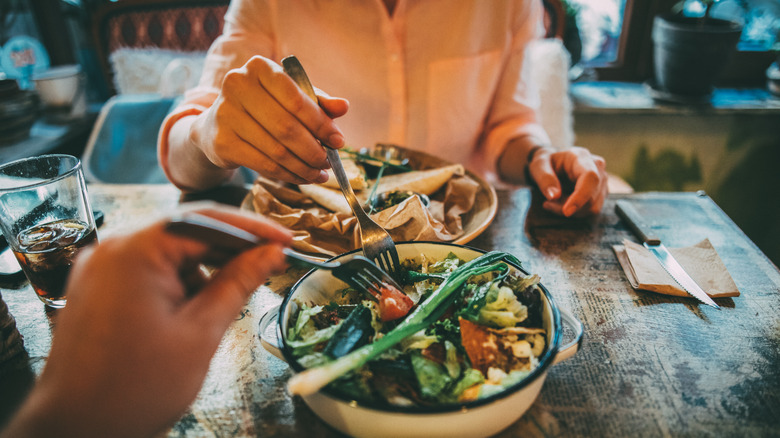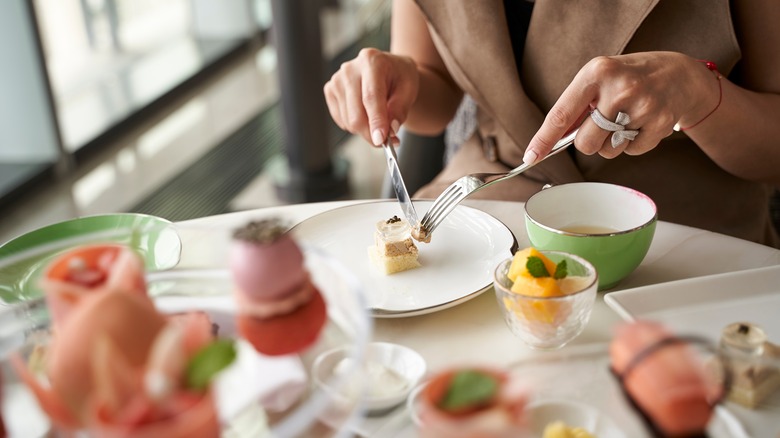The Etiquette Rules Martha Stewart Lives By When Dining Out
Did you know that picking up a dropped napkin is actually bad restaurant etiquette? That's because it could spread germs from the floor to the table in much the same way picking up a dropped utensil would. Alas, poor table manners don't stop there. In fact, there's probably restaurant etiquette you break the moment you finish eating: pushing your plate away. Fortunately, Martha Stewart is here to save us from ridicule and sheer social embarrassment while eating out. The kitchen queen and all-around lifestyle guru recently revealed her top etiquette rules for dining out in an interview with People, which include not "eating too fast" or "stuffing your face full of food."
But, that's not all. The TV personality also shared her disdain for people who are rude to their waiters, noting that "being unpleasant to waitstaff" is another major "no-no." For a shining example of how you should behave whilst eating out, one need look no further than Stewart's 12-year-old granddaughter, Jude. "She sits straight, she puts her napkin on her lap, [...] and she's extremely polite," the entrepreneur told the publication, adding that going out to eat "really does require pleasant behavior in a restaurant." Being pleasant at a restaurant? It's a good thing.
Eating too fast may actually be bad for you
When it comes to Stewart's dining etiquette, it should come as no surprise that shoveling food in your mouth is often viewed as rude. However, taking smaller bites can actually help you avoid speaking with your mouth full, thus making it easier to converse (and more pleasant, let's be honest) with others at your table. Not to mention, it may help reduce the risk of choking. The same goes for eating too quickly, which can also be bad for you in terms of impeding digestion, according to MedlinePlus.
That's because when you eat food in a hurried manner, you actually swallow more air. This can result in an array of digestive issues like bloating and excessive gas. Moreover, when you eat quickly, you're far less likely to chew your food sufficiently into smaller pieces, which is essential for allowing your digestive system to properly break down the meal (per Intestinal Labs). And, since it takes about 20 minutes for your brain to register that your stomach is full, eating quickly may also delay feelings of fullness, which can potentially lead to overeating (via MD Anderson Cancer Center).
Just don't eat too slowly either
Those interested in embracing proper dining etiquette may want to pay heed to Stewart's recommendation about not eating too quickly. However, you should also make it a point not to eat too slowly either. As it turns out, consuming food at a slow pace is also considered bad etiquette. Eating so slowly that other guests have to wait so that you can finish your food is largely frowned upon. This is especially true in busy restaurants where people will have to wait longer for your table.
The same can be true for private dinner settings, such as a house party, because your host may surmise that you don't like their food. Plus, the host may have other events planned for the evening — a post-dinner cocktail, or they may simply want to hit the hay early. So, instead of eating too fast or too slow, try and find a satisfactory medium by eating at a moderate pace — this follows Stewart's rule of having "situational awareness" when eating with others (per Travel and Leisure). When in doubt, a good rule of thumb is to enjoy your food at a speed that matches the people you're eating with. Follow Stewart's guide of being pleasant for the optimal dining experience: Don't make a mess and be polite. Just don't forget to keep your elbows off the table, too.



